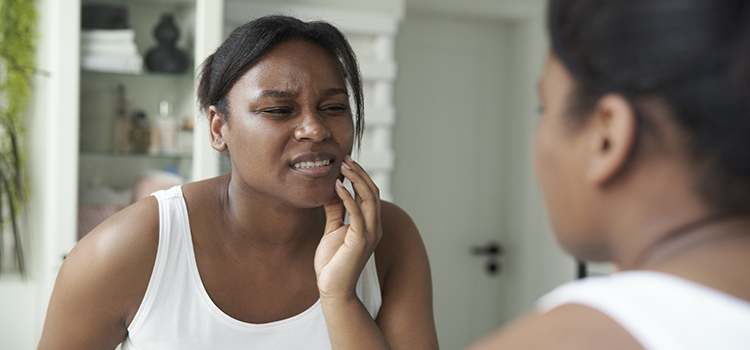Teeth Feel Weird? 5 Common Issues
10th Nov 2024

Have you ever noticed your teeth feeling a bit “off” or just nothing feels quite right? It’s more common than you might think that your teeth feel weird, and while it can be a little worrying, it’s not always a sign of something serious. In fact, feeling discomfort or odd sensations in your teeth can often be a normal part of dental adjustments, such as after getting braces or dental work.
Sometimes, it’s just a temporary thing that passes on its own. Other times, though, it might be your body’s way of telling you there’s a bigger issue with your dental health that needs attention and medication. Figuring out the cause can help you decide whether to wait it out or book a visit to your dentist.

5 Common Causes of Unusual Teeth Sensations
In many cases, the sensation of teeth feeling weird can be a symptom of underlying dental issues such as cavities, gum disease, or misalignment.
If your teeth are feeling tingly or strange, there could be several reasons behind it. Here are 5 common causes:
1. Tooth Sensitivity
What it is: Tooth sensitivity occurs when enamel wears down or gums recede, exposing sensitive areas of your teeth.
What causes it: It’s often triggered by hot, cold, or sweet foods and drinks. Brushing too hard, consuming acidic foods, or natural aging can also lead to sensitivity.
What to do: Switch to a toothpaste designed for sensitive teeth, avoid acidic foods, and brush gently.
When to see a dentist: If the sensitivity doesn’t go away or worsens, a visit to the dentist is recommended, as it could be a sign of a more serious problem, like tooth decay.
In some cases, unusual sensations in the mouth may indicate erosion of the tooth enamel, which can lead to increased sensitivity and a higher risk of cavities if left unattended.
2. Bruxism (Teeth Grinding)
What it is: Grinding your teeth, especially at night, puts pressure on your teeth and jaw, which can lead to soreness or odd sensations.
What causes it: Stress, anxiety, or sleep issues are common triggers for teeth grinding.
What to do: Wearing a mouth guard can protect your teeth, and stress-relief techniques like meditation may help reduce grinding.
When to see a dentist: If you wake up with sore teeth or jaw pain, or notice wear on your teeth, it’s time to visit a dentist for guidance.

3. Recent Dental Work or Appliances
What it is: Fillings or other dental implant procedures can make your teeth feel strange temporarily. Appliances like night guards or retainers can also cause discomfort if they don’t fit properly. In some cases, the feeling of weirdness in the teeth may signal the need for a dental crown to restore proper function and alleviate discomfort caused by decay or damage.
What causes it: Your teeth may need time to adjust after dental work, or the appliance might not be fitted correctly.
What to do: Give it a few days to see if the sensation improves. If not, consult your dentist to adjust the appliance.
When to see a dentist: If the discomfort or numbness lasts more than a few days or your appliance feels too tight or loose, it’s best to visit your dentist for an evaluation.
4. Tooth Decay or Gum Disease
What it is: Early signs of cavities or gum disease can cause discomfort or make your teeth feel “off.”
What causes it: Plaque, bacteria, and tartar buildup from poor brushing and flossing can lead to decay or gum infections.
What to do: Brush and floss daily, and visit your dentist regularly for cleaning to prevent these issues.
When to see a dentist: If the tooth pain persists, or you notice a red area, swollen gum texture, or tooth cavity, it’s time to schedule a dental checkup.
5. Nerve Issues
What it is: Nerve damage inside your tooth can lead to unusual sensations or pain.
What causes it: This can result from deep decay, tooth injury, or a serious infection.
What to do: Dental treatment, such as a root canal, may be necessary to address the damaged nerve.
When to see a dentist: If you experience sharp or constant ache, or the sensation persists on nerves, visit your dentist as soon as possible to prevent further complications.
Could Your Night Guard or Dental Appliance Be the Cause?
If you wear a bite guard or dental appliance, it could be the case behind the odd feeling in your teeth. Here’s what to watch out for:
Signs of a Poor Fit
- Night guard feels too tight or too loose.
- It puts pressure on certain teeth.
- Can lead to discomfort, requiring adjustment by a dentist or online retailer.
Temporary Discomfort
- Some discomfort is normal when first using a night guard.
- This discomfort should improve after a few nights.
- If discomfort persists, the night guard may need to be refitted.
Bruxism and Night Guard Use
- Mouthguards protect teeth from grinding (bruxism).
- A poor fit can increase pressure instead of reducing it.
- A poorly fitting guard might be the reason for unusual teeth sensations.
Related Articles:

How to Ease Discomfort from Unusual Teeth Sensations
If your teeth feel a bit tingling, but it doesn’t seem serious enough for a dental visit, here are a few simple things you can try to ease the discomfort:
Practice Good Oral Hygiene:
Brush your teeth twice a day and floss regularly. Use mouthwash. Use fluoride toothpaste, and if you have sensitive teeth, switch to a toothbrush and toothpaste specifically designed for sensitivity. Maintaining good oral hygiene can help manage any underlying condition that may be contributing to the strange sensations in your teeth.
Adjust Your Diet:
Limit acidic and sugary foods like citrus, soda, and hard candies. See if cutting back on these reduces the strange sensation in your teeth. Paying attention to how different types of food interact with your teeth can provide valuable insights into the underlying issues you may be experiencing.
Check Your Night Guard Fit:
Make sure your night guard fits properly and doesn’t put extra pressure on your teeth. If it feels uncomfortable, schedule a dentist appointment or contact your online retailer to ensure it’s providing the right protection.
Relax and Reduce Stress:
Stress can cause teeth grinding, leading to discomfort. Try relaxation techniques like deep breathing or meditation to help manage stress.
Schedule Regular Dental Checkups:
Regular dental visits can help catch small issues early, even if your discomfort subsides. Dentists can also provide guidance on proper dental hygiene practices that may alleviate any unusual sensations in your teeth.
Related Articles:
Should I be worried if my teeth feel odd?
If you're experiencing unusual sensations in your teeth, it's essential to question whether any recent changes in your oral hygiene routine or diet might be contributing to the discomfort.
It’s important to know whether an odd feeling in your teeth is a temporary issue or a sign of something more serious. Here’s what to keep in mind:
Signs That Require Immediate Attention
- Persistent pain.
- Swelling in your gums.
- Visible changes such as cracks in your teeth.
- These could indicate infection, decay, or nerve damage.
Persistent Sensitivity
- Sensitivity to hot, cold, or pressure that doesn't go away.
- May indicate tooth decay, gum disease, or exposed tooth root.
- If untreated, these conditions can worsen.
Prolonged Discomfort
- If discomfort lasts more than a few days or intensifies, it needs attention.
- This could signal potential nerve damage.

Should You See a Dentist or Wait?
Advancements in modern dentistry have made it easier than ever to diagnose and treat unusual sensations in the mouth. However, deciding whether to see a dentist or wait can be tricky when your teeth feel off. Here are some ways to help you choose the best course of action:
Right Away:
If you experience pain, swelling on the jawbone, or notice visible issues like cracks, chips, or changes in your gums, these could be signs of tooth decay, gum disease, or infection. Seek immediate attention from your dentist. Additionally, a change in how your teeth feel may indicate an issue with their alignment too, which can lead to discomfort and potential complications if not assessed by a professional doctor.
If the Sensation Lasts More Than a Few Days:
If you notice that your teeth feel weird despite maintaining your usual habits, it may be time to schedule an appointment at your dentist's office to rule out any underlying dental issues.
If a sensation like toothache doesn’t go away or worsens, it could indicate nerve damage or tooth decay. It’s best to address the issue early to prevent complications.
After Recent Dental Work
Some mild discomfort is normal after getting fillings, crowns, or a new night guard. However, if the discomfort persists for more than a week or becomes painful, visit your dentist to check your healing or the fit of the appliance. Paying attention to any unusual symptoms, such as sensitivity, discomfort, or changes in texture, can help you articulate your concerns more effectively during your visit.
Temporary Sensations:
If the sensation is brief and doesn’t get worse, it might not require immediate action. Sensitivity can be triggered by certain foods or habits and may resolve with small adjustments.
 Shop Now
Shop Now
FAQs
What should I do if my teeth feel strange after flossing?
If your teeth feel weird after flossing, it might be because you’re flossing too hard or irritating your gums. Try flossing gently. If the feeling doesn’t go away, it could be a sign of gum irritation or something more serious, so it’s a good idea to check with your dentist.
Can sinus problems cause my teeth to feel strange?
Yes, sinus pressure from a cold or allergies can cause discomfort in your upper teeth. This happens because the roots of your upper teeth are close to your sinus cavities, and pressure or inflammation can make them feel sore.
Can using a new toothpaste make my teeth feel odd?
Yes, switching to a new type of toothpaste, especially anything with whitening or abrasive ingredients, can cause sensitivity. If this happens, try using a toothpaste designed for sensitive teeth.
Can hormonal changes cause my teeth to feel strange?
Yes, hormonal changes, like during pregnancy or menopause, can make your teeth and gums more sensitive. Good oral hygiene and regular dental visits can help manage this.
Can stress make my teeth feel strange?
Yes, stress can cause teeth grinding or clenching, leading to soreness or discomfort. A properly fitted mouthguard and relaxation techniques like meditation can help ease the pressure.
Can recent teeth whitening cause my teeth to feel strange?
Yes, teeth whitening can temporarily increase sensitivity, making your teeth feel strange. This one should go away in a few days. In the meantime, using a toothpaste for sensitive teeth and avoiding very hot or cold foods can help.

Conclusion
Many people may experience unusual sensations in their teeth from time to time, but understanding the potential causes can help alleviate any concerns. Feeling a strange sensation in your teeth can be unsettling, but it’s often temporary and has many possible causes, like sensitivity, grinding, or dental work. It could also be linked to new medications you may be taking or sinus issues.
In many cases, small changes to your routine can help ease discomfort. Additionally, it's crucial to collect any relevant information about your symptoms, such as when the discomfort began or any changes in your oral care routine, to share with your dental professional.
However, if it persists, gets worse, or comes with pain or swelling, it’s best to see your dentist. Addressing the issue early can prevent bigger problems later and give you peace of mind.

- Most Popular
- Hard Outside, Soft Inside
- 2MM Thick
- Moderate / Heavy

- Most Durable
- Hard Materials
- 1.5MM Thick
- Heavy / Severe

- For Day Time Use
- Thin, Barely Visible
- 1MM Thick
- Light / Moderate

- For Clenching
- Flexible & Soft
- 1.5MM Thick
- Light / Moderate
